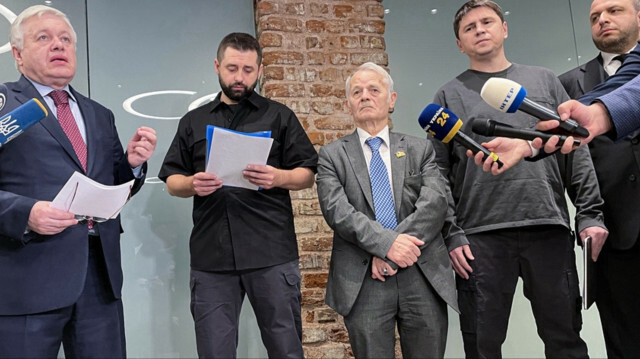
An agreement on security guarantees is effective tool for protecting Ukraine's territory and sovereignty, says Mykhailo Podolyak
The refusal of mutual military escalation over the issue of Crimea is key to a general cessation of hostilities, a top Ukrainian negotiator said Tuesday following peace talks with Russia in Istanbul, Turkiye.
The Ukrainian Presidency in a statement cited the comments by Mykhailo Podolyak, the top Ukrainian negotiator and adviser to President Volodymyr Zelenskyy, on the negotiations.
Ukraine’s state news agency Ukrinform reported earlier that the issues of the occupied Donetsk and Luhansk regions and Crimea would be taken out of the main part of an international agreement on security guarantees for Ukraine and discussed separately.
"As for such issues as Crimea, this is a separate clause of the agreement, in which we propose to enshrine the position of Ukraine and Russia to hold bilateral talks on the status of Crimea and Sevastopol for 15 years," it quoted Podolyak as saying.
Referring to this proposal for direct bilateral negotiations on Crimea for 15 years without the use of military force, he said it was a “revolutionary achievement, since this means, at the least, the return of the topic of Crimea to the negotiating agenda."
"Before, the Russians categorically refused to do so. And besides, it allows us to preserve the current legal interpretations of Crimea, since Crimea is, of course, a part of Ukraine for us," he added.
Noting that the talks held in Istanbul are important in terms of enabling Russia to consider many issues, Podolyak said "the treaty on security guarantees in fact presupposes -- not in theory, but in practice -- to obtain an effective tool for protecting our territory and sovereignty."
“Let's say the leading armies of the world, including those with a nuclear constituent, become guarantor countries, assuming specific legal obligations -- to intervene in any conflict on the territory of Ukraine, with the immediate supply of weapons,” he said.
Pointing out that the treaty will also affect the new global security system, Podolyak noted: “This treaty makes it possible to start revising the old model of global security, which has not shown effectiveness in the current situation, and move on to more effective models.”
Noting that his country is the initiator of a new type of security system reform, Podolyak also pointed out that Ukraine will enter the European common market.
"This is very important both in terms of financing large-scale programs for the modernization of the economy and in abandoning excessive bureaucratic procedures on the way to EU accession,” he said.
Podolyak stated that Russia's presence as a signatory to the multilateral treaty along with other countries, including the US, Turkiye and Germany "imposes many additional burdens on the Russians and allows us not to go for a complicated bilateral format."
Earlier rounds of Russia-Ukraine talks, held in person in Belarus or by video, had failed to make any significant progress on ending the war, which has killed at least 1,179 civilians in Ukraine, injured 1,860 others and driven almost four million Ukrainians to neighboring countries, according to UN estimates.

